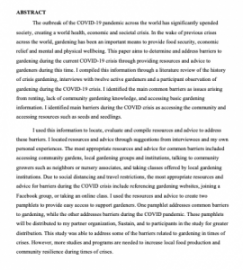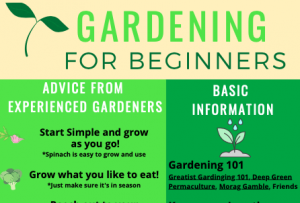Crisis Gardening: Addressing Barriers to Home Gardening during the COVID-19 Pandemic
Hannah Katz, Environmental Studies, Hamilton CollegeThe outbreak of the COVID-19 pandemic has drastically affected almost every aspect of global, national, and local societies. The main strategies for reducing and containing the spread of the coronavirus, published by the World Health Organization, are practicing social distancing and good hygiene, and staying home as much as possible (WHO, 2020, para. 1). In Australia, as with much of the rest of the world, these guidelines manifested in closing non-essential workplaces, telecommuting, and discouraging travel whenever possible. As cases begin to stabilize or decrease, many places around the world, including Australia, are talking about easing restrictions to begin reopening the economy. However, Chief Medical Officer Professor Brendan Murphy says that social distancing and hygiene procedures need to remain in effect as long as the COVID-19 virus continues to be a threat (Rose et al., 2020, para. 2). With estimates that a vaccine will emerge by mid-2021 (Gallagher, 2020, para. 4), it is important that we are able to operate effectively as a society during this long-term upheaval.
Although social distancing and staying home have been beneficial in helping reduce the spread of the virus, these practices have caused secondary effects in society such as panic buying and food hoarding, physical and mental health challenges, and shifts in environmental practices (Cannavo, 2020; Laing 2020, para 17). Social distancing and staying at home are essential to the health and wellbeing of society. However, food access, mental and physical health, and environmental sustainability are also essential to a functional society. Throughout large scale crises of the past such as World Wars I and II, the Cuban economic collapse, the Great Recession of 2008, and today in refugee camps in Iraq, gardening has provided access to food and community, physical and mental health benefits, and more sustainable communities (Čepić and Tomićević-Dubljević, 2017, pp. 192-193) (Laing, 2020 para, 17) (Oxfam America, 2020) (Tomikns at al., 2019, pp. 106-113).
This paper will focus on exploring the benefits of gardening to individuals and society during crises. It will identify common barriers to gardening and address these barriers as they relate to the COVID-19 pandemic, by providing resources to reduce these barriers. This study is relevant to the current state of the world because it aims to help people and societies work through the COVID-19 pandemic. It also provides information for increasing community resilience during other extreme events, which are likely to become more common due to climate change (IPCC, 2014, pp.13-15).


Want to know more? Get in touch with Hannah here.